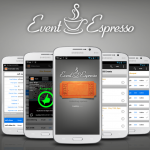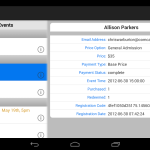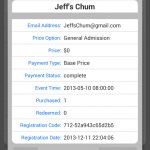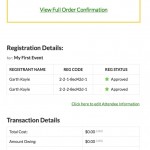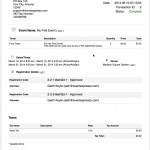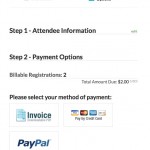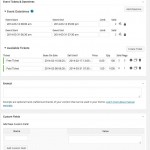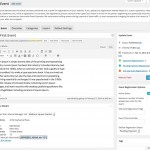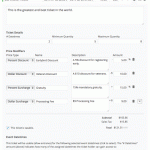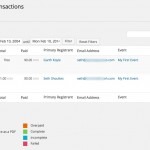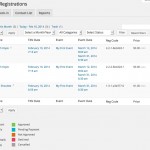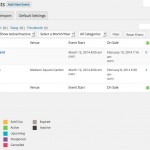What do you need help with?
Posted by Garth on Thursday, April 17th, 2014
What happened?
At approximately 1pm EST the EventEspresso.com website host, HostGator experienced a network outage. HostGator guarantees 99.9% uptime with all their dedicated servers which means that our website server should not be down (unexpectedly) for more than 9 hours the entire year—but yesterday alone our server was down for more than 12 hours!
We know this was really bad timing for everyone. Just 10 hours earlier we released Event Espresso 4.2 and began sending email notifications to users to download the update. We apologize for the interruptions and inconvenience this caused. We are taking actions to try and ensure something like this doesn’t happen again.
Going Forward
HostGator use to be very reliable, but the recent disruptions (this was not the first, nor the second interruption) indicate that we can not rely on them for the level of service we need for EventEspresso.com (99.9%+ up-time). Within the next 30 days we intend to move EventEspresso.com to a new hosting service that has a better infrastructure to meet those types of expectations and guarantees. Our hope is that any downtime in the future is intentional and/or scheduled.
This means that there will be some additional disruptions as we go through the process of changing hosts. However, we hope these disruptions are intentional, controlled, and relatively brief. Once we have made the full transition to another host we expect that you will find that the EventEspresso.com website loads faster and is more reliable.
Thank you for your patience, and please pardon the construction as we change the filters on the Event Espresso machine.
9 Comments
Posted by Garth on Wednesday, April 16th, 2014
Since February when we released EE4 without any add-ons, we’ve realized that many people don’t need add-ons (such as the calendar); all they need is the core plugin. These users also do not want to be required to purchase something they do not need. As such, we’ve changed our method of packaging add-ons with the core plugin. The Event Espresso 4 Personal and Developer Licenses will no longer include add-ons. Add-ons can be purchased separately by anyone with at least a Personal Support License (whether EE3 or EE4 Personal Support License).
What is happening to the EE4 Developer License?
The EE4 Developer License is now an even better value. The EE4 Developer License includes five license keys, AND you can purchase any EE4 add-on ONCE and use it with as many licenses as are on your account. This makes the EE4 Developer License more valuable with each add-on you purchase because you get even more great event registration software at a greater discount.
Where is the EE4 Business License?
In the near future we will offer a “Business License” (might be a different name) that is essentially a package that offers “one of everything” at a significantly discounted rate. This will allow event managers to get access to all our great event registration software for a super price. This support license package is yet to released.
These changes make Event Espresso more affordable and accessible to all event managers and WordPress developers.
2 Comments
Posted by Garth on Tuesday, April 8th, 2014
Now Available!
We’d like to announce that Event Espresso 4.2 and the Events Calendar Add-on are now available. EE 4.2 includes over 60 changes and this is the first release of the Events Calendar Add-on for EE4.
Please note, EE 4.2+ is required before the EE4 Calendar Add-on will work.
Two New Major Features
Support for Mijireh Chekout
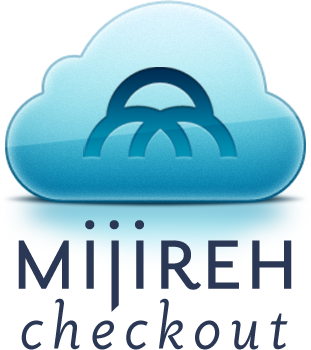 Announcing the ability to integrate with over 90 different gateways and payment providers, using the Mijireh Checkout system! Mijireh Checkout is a PCI compliant checkout page that looks exactly like your site, with support for over 90 gateways and payment providers to use on Mijireh’s secure PCI compliant servers. (see the Payment Settings inside EE 4.2).
Announcing the ability to integrate with over 90 different gateways and payment providers, using the Mijireh Checkout system! Mijireh Checkout is a PCI compliant checkout page that looks exactly like your site, with support for over 90 gateways and payment providers to use on Mijireh’s secure PCI compliant servers. (see the Payment Settings inside EE 4.2).
Mijireh Checkout helps increase your conversion rates by using your existing website design. Your checkout process remains seamless to your customers while Mijireh Checkout securely handles the collecting and transmitting of the credit card data for you.
Calendar Add-on for EE 4.2+
The Events Calendar allow you to display your events in a way that customers are familiar with, gives you another page of your website or another way for customers to find your events, and allows you to invite attendees to add the events to their own calendars as a friendly reminder.
The EE4 Calendar Add-on includes:
- Inline calendar images
- Category filtering
- Venue filtering
- Featured images
- Datetime and format settings
- Tooltips
- Color coded categories
- Better compatibility with themes
- and much more!
Compatible with most responsive themes
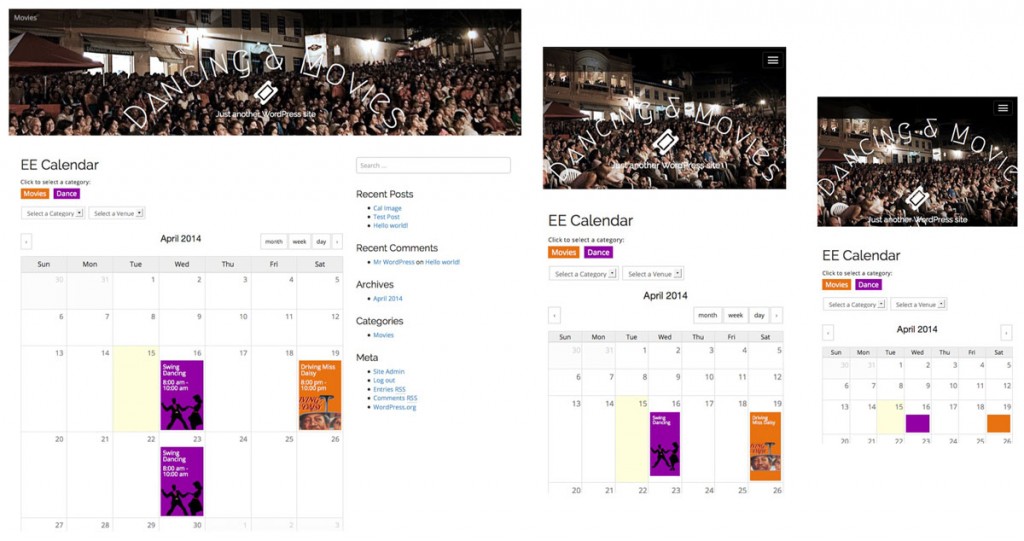
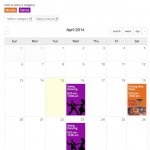 EE4 Events Calendar |
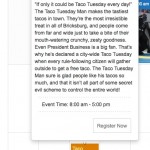 Calendar Tooltips |
Please note, EE 4.2+ is required before the EE4 Calendar Add-on will work.
Additional Features & Enhancements in EE 4.2
In addition to better out of the box support for themes and plugins, we have added an array of new features. These include drag and drop ordering of tickets in the event editor, ordering of questions within question groups, datetime names and descriptions, and the option to turn off the ticket selector in the event details page, and much more:
- Added support for Mijireh Checkout
- Added support for the Calendar Add-on
- Drag and Drop ordering of tickets in the event editor
- Order Questions by Question Group (no longer ordering questions by question order)
- Option to turn OFF the Ticket Selector in the Event Details page for events without tickets/registrations
- Ability to add/edit Event Datetime Names
- Ability to add/edit Event Datetime Descriptions
- Added Event Datetime Name messages shortcode
- Event Datetime Description messages shortcode
- Added datetime titles and descriptions to the order confirmation
- Added front-end “Maintenance Mode” option
- Added “Register Now” or “View Details” button in the event list when the Ticket Selector is turned off
New Hooks, Filters, and Stuff for Developers
Here are a few more of the new features and cool stuff for developers available in 4.2 and we’d like to invite you to take a look and offer feedback (praises, report bugs, etc.):
- Hook/Filter to Set No-cost events as “Free”
- Add filter so the email messenger CSS file can be swapped out by developers for another CSS file
- Added a hook in the Admin panel after each ticket row description
- Added a hook in the Admin panel after each ticket create and update model
- Added hook in the Front-end after each ticket date on a single event
- Made Single Page Check Out (SPCO) button text filterable
- Models make acceptance of empty strings more consistent
- Simplified the EE_System Constructor and Hook point’s to allow for external module/add-on/plugin development
- EEH_Template::locate_template() to accept full paths as well as relatives paths (from plugin root)
- Filter for adding caffeinated modules to EE_Config $modules_to_register array
- Make Single Page Check Out (SPCO) button text filterable
4.2 Screenshots
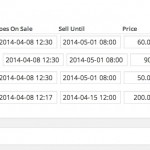 Drag and drop reordering of tickets. |
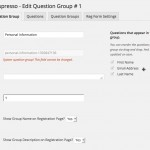 Drag and drop ordering of questions in categories |
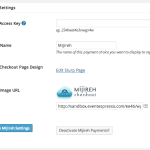 Mijireh Checkout settings |
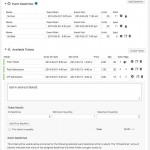 Datetime Editor |
1 Comment
Posted by Darren Ethier on Tuesday, March 4th, 2014
One of the most powerful features added to Event Espresso 4 is the new messages system. In this post, we’re going to give you an overview of what this new system is, some of the terms you’ll come across when working with it, and tell you why we think Messages is so powerful.
What is “Messages”?
The messages system is the engine that powers all the notifications that go out from EE when triggered by different things happening on your Event Espresso powered website. By different things I mean things like:
- when person registers for an event
- when a payment is made
- when a registration is cancelled
- etc.
When one of these things happens (we call them triggers) then the messages system kicks in to prepare and send out notifications about what happened. At this point there are a number of components in the messages system that play a role in assembling and sending a message. Let’s take a look at what those components are:
Message Types
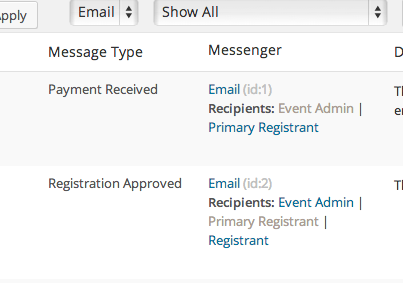 Message Types describe the kind of message that is being sent and describe what the content of the message will be about. In Event Espresso there are currently (as of the time of writing this document) 8 different message types. Three for payment related messages (payment received, payment reminder, payment declined), and five registration related messages (registration approved, not approved registration, registration pending, registration declined, registration cancelled). Message types are attached to triggers
Message Types describe the kind of message that is being sent and describe what the content of the message will be about. In Event Espresso there are currently (as of the time of writing this document) 8 different message types. Three for payment related messages (payment received, payment reminder, payment declined), and five registration related messages (registration approved, not approved registration, registration pending, registration declined, registration cancelled). Message types are attached to triggers
Messengers
Messengers describe the vehicle that delivers the messages. The most common delivery vehicle pretty much all of us are familiar with is email! This is why email is the first and currently only messenger used by the messages system however it is important to note (and I’ll expand on this later) that it is not intended to stay that way.
Contexts
A context describes who or what receives the message. You won’t see the word context much in the UI for messages because the labels for contexts are dynamic and are defined by message types (but can also be overridden by messengers). When defined by the system, they will take on a label that more accurately describes the intent. For instance with all the current message types in the system there are up to three contexts available (which are labelled recipients in the ui): event admin, primary registrant, and registrant. The purpose of the context is to empower you to be more granular in the messages you send out.
As an example, for the Registration Approved message type, the event admin may receive summary details of the registration that was approved, whereas the primary registrant will receive information pertaining to the whole group registered, and the registrant just receives details on their specific registration for the event.
Keep in mind that the number of contexts available per message type and messenger combination is variable depending on how they’ve been designed by us (or the third-party plugin for the messages system). For instance, we didn’t include the registrant context with any of the payment message types because its really only the primary registrant (the one who completed the registration) who is concerned with paying for the tickets.
Message Templates
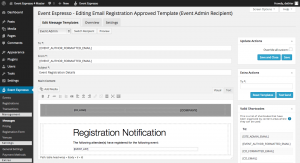 Message Templates are the blueprint for what the message will look like when its assembled. This is a very powerful component to the messages system because it allows for more granular control of the “looks” of outgoing messages.
Message Templates are the blueprint for what the message will look like when its assembled. This is a very powerful component to the messages system because it allows for more granular control of the “looks” of outgoing messages.
The important thing to remember about message templates, is that there is a message template for each messenger, message type, and context combination. So for example, there is a template for the email messenger, registration approved message type, and Event Admin recipient (context).
Each message template will have fields that are defined by the messenger primarily but also supplemented by the message type if there are any additional fields required by the message type. For instance, all email templates will have to, from, subject and main content fields.
Note
You will see other fields like
[event_list],
[attendee_list] etc in the message templates. These are special fields related to messages
shortcodes which I’ll be getting to in a
later section.
When you activate Event Espresso, the message system comes with default global templates out of the box that will help you get started right away with your events without having to do any editing. However you are able to edit any of these templates.
Difference between Global and Event specific templates
One more powerful feature with the new messages system is that by default, global templates will apply to every trigger happening with an event. So that means, for example, when a registration is approved (the trigger), all the global templates using the Registration Approved message type get sent. However, the messages system also allows Event Authors to create a custom template for that message type to be used only for that event. If this is done, then when the Registration Approved message type is triggered the message template for that event is used instead of the global message template. This allows you to differentiate different automatic messages for different events.
Message Shortcodes
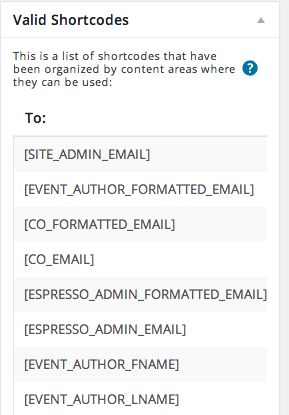 Message shortcodes are special snippets of text that allow for precisely controlling how dynamic content will display in the message template. If you are familiar with how WordPress shortcodes work then using these shortcodes should be fairly straightforward. Shortcodes such as
Message shortcodes are special snippets of text that allow for precisely controlling how dynamic content will display in the message template. If you are familiar with how WordPress shortcodes work then using these shortcodes should be fairly straightforward. Shortcodes such as [EVENT_NAME], [REGISTRANT_FNAME], [EVENT_AUTHOR_FORMATTED_EMAIL] all provide an easy way to indicate where dynamic content will be inserted when messages are sent.
There are also special shortcodes that we call list-type shortcodes. These are shortcodes such as [ATTENDEE_LIST], [EVENT_LIST], and [QUESTION_LIST]. These shortcodes are special because when you use it, you are indicating that this is where you want a list of items to be displayed in your template. When the message generator gets to this shortcode, it will signal it to look for a corresponding field in the template to know how to parse each item in the list. So when you see a field in a message template that is labelled with [event_list] then you know that when the [EVENT_LIST] shortcode is parsed, the generator will look in the [event_list] field to know how to parse each event item. Super powerful!
What’s Next?
We intentionally built the messages system so it would act more like a framework for being able to rapidly add different kinds of messengers and message types for Event Espresso. We also hope that third party developers will also find this to be a useful tool for adding their own messengers and message types into the system. Want some examples?
- What about a Facebook messenger for posting notifications to a Facebook page?
- What about a Twitter messenger for posting notifications to your event twitter account?
- Or maybe a messenger to connect data from different triggers with your favorite accounting app via their API?
- Or maybe a messenger to connect Event Espresso with Zapier or If This Then That.
Here’s some message types we are working on for future iterations of EE4:
- a newsletter message type that will allow you to send batch emails to all registrations or contacts (or subsets meeting certain criteria)
- an automated event notification message type that let’s contacts know when you’ve posted a new event.
- automated payment reminder message type that works similarly to the current payment-reminder message type except that this new one will allow you to set a schedule for sending messages to people who haven’t paid for their ticket yet.
There are all kinds of ideas we’ve heard from customers about notifications and how they should work and we’re excited because we now have a solid framework to build out some of those ideas (and for others to build their ideas). Have you tried the messages system in EE4 yet? What do you like/dislike about it? We’d love your feedback!
Comment
Posted by Seth Shoultes on Friday, February 21st, 2014
What are Custom Post Types?
WordPress can hold and display many different types of content. A single item of such a content is generally called a post, although post is also a specific post type. Internally, all the post types are stored in the same place, in the ‘wp_posts‘ database table, but are differentiated by a column called ‘post_type’. A Custom Post Type (CPT) is nothing more than a regular post with a different ‘post_type’ value in the database. The post type of regular posts is post, pages use page, attachments use attachment and so on. More information Custom Post Types can be found at WordPress: http://codex.wordpress.org/Post_Types
By default, Event Espresso provides full-page Event and Venue CPT archives and single page templates.
How are Custom Post Types used in Event Espresso 4?
Custom Post Types allow developers to integrate Event Espresso into your theme and reuse attendee data as you would other post data. This gives developers the ability to create great looking customizable event designs, by giving you the tools they need to easily integrate EE4 core components into themes and reuse attendee data as you would with other post data (please see our EE4 Custom Post Types documentation for more information).
In addition, the EE4 front-end templating systems provides flexible “template parts” that can be used by theme developers for custom themes. In order to maintain compatibility with more themes, these template parts have only basic styles by default but you can easily make them more fancy with custom CSS (see our Theming in Event Espresso 4 post for more information).
The EE4 specific template parts include:
- Event Details (description)
- Event Datetimes
- Event Tickets
- Event Venues
- Event Venue Location
- Event Venue Detail (excerpt)
- and more!
Many of the standard custom post type data is also available via standard WordPress
Custom Queries (e.g. featured image, title, comments, etc.).
CPT Types: Events, Venues, and Contacts
All EE4 CPT data includes normal post data including:
- Title
- Description
- Tags
- Categories
- Featured Image
- Commenting
- Excerpt
- Custom Fields
- Slug
- Author
This data can be queried and displayed in themes along with other post data.
CPT Archive Pages
As with other Custom Post Types, EE4 is packaged with default event archives, single event pages, venue archives, and single venue page templates. You can copy these templates to your theme folder so that the Event Espresso pages inherit your theme’s post page layouts and styles. See our post on Theming in Event Espresso 4 for more information.
Draft Event Pages
Draft events allow you to build your event page over time without publishing it to your website.
We know you can’t always build and publish an event at once. EE4 will allow you to save events as “draft” status so that you can save your progress and return later to edit and publish your event.
EE4 will automatically save the events you have in-progress as “drafts”, plus you can save them as a “draft” as you go.
Schedule Events to be Published
You can even schedule to publish your event at a later date and time.
WordPress enables you to schedule when posts and pages are published. That functionality extends into Event Espresso’s CPT pages so you can announce your event at just the right moment.
Easy Categorization of Events
Do you have several different types of events such as free and paid, conference speakers and breakout sessions, exercise classes of all kinds? EE4 makes it easy categorize your events and allows your attendees to find what they’re looking for faster.
Plugin and Theme Compatibility
Event Espresso 4 offers much better theme compatibility, because all of your EE4 Events, Venues, and Contacts are CPTs. Event Espresso CPTs can also integrate with other CPT plugins such as: Custom Post Type UI, TinyMCE Advanced, Advanced Custom Fields, etc.
Are you a WordPress theme developer? Want to see how Event Espresso 4 integrates with your theme?
Request access to the Event Espresso Core (4.0+) GitHub repository and get acquainted with the premier event registration system for WordPress.
Comment
Posted by Seth Shoultes on Wednesday, February 19th, 2014
What is the best way to customize EE4?
We think the BEST way to theme EE4 really depends on a few factors with the biggest factor being what you want to change. Sometimes all that is needed is a few CSS edits and other times customizations are done via a child theme, or even editing the PHP, HTML, and/or CSS files.
Basically, this means that existing WP theme developers will have an easier time developing customizable event designs for EE4, which in turn can benefit the end user. Developers are encouraged to view the list of currently available theme templates and tags.
Depending on what you want to change and your skill level, here are some options:
Child Themes
We want to make things as simple as we can for the end user, but with all the possible themes in use, there is a limit to how simple we can make it to customize things. The best solution (which is what we’ve taken IMO), is to integrate EE4 in “proper” WP ways that the majority of WP developers will understand. This ultimately benefits the end users who hire theme developers, or theme shops, that support EE4 templates in their themes.
Reassembly of the EE4 templates
Oh wait! Your theme doesn’t support child themes? No problem, simply reassemble all of the EE4 template parts and combine them with your theme’s templates to make one cohesive archive-espresso_events.php (or single-espresso_events.php, etc) file, that integrates perfectly with your theme. The files that contain the template tags that should be loaded automagically, anytime an incoming request is for one of EE’s CPTs (otherwise they can be found in the /core/helpers/ folder).
The Event Espresso specific template parts include:
- Event Details (description)
- Event Datetimes
- Event Tickets
- Event Venues
- Event Venue Location
- Event Venue Detail (excerpt)
Custom Post Types
We think theming Event Espresso will be easier using Custom Post Types (CPTs), because we are now following the WordPress (WP) Theme Development Standards. This makes it easy for WP developers and theme shops to build integrations with their themes and plugins in EE4.
EE4 CPT data includes normal post data including:
- Title
- Description
- Tags
- Categories
- Featured Image
- Commenting
- Excerpt
- Custom Fields
- Slug
- Author
This data can be queried and displayed in themes along with other post data.
What option is right for me?
We don’t know the specifics of your website, so it’s up to you to decide where to go from here. We are happy to recommend a few helpful tips:
- If your goal is along the lines of “I want the events page to match my theme better” then the answer is usually a CSS solution. Sometimes a few CSS edits are all that are needed, and if you don’t have a child theme set up (or don’t want to) you can install a CSS builder plugin like this one and customize with CSS (it turns out that you can do a lot with CSS changes only).
- Just want to change the wording of a few phrases? If so, no need to hack templates, just use Josh’s WP gettext filter.
- If you need to add/remove content that’s not already in the event template, then setting up a child theme and working through the templates and using Event Espresso’s WordPress hooks and filters may be the way forward.
- Sometimes, if it’s a PHP, HTML, or CSS based solution, you may need to contact a developer familiar with PHP, HTML, and/or CSS to help out. Our support team is also available in the support forums and will recommend the best solution for what you are trying to accomplish.
Are you a WordPress theme developer? Want to see how Event Espresso 4 integrates with your theme?
Request access to the Event Espresso Core (4.0+) GitHub repository and get acquainted with the premier event registration system for WordPress.
Comment
Posted by Seth Shoultes on Tuesday, February 18th, 2014
 We are very happy to announce that the Event Espresso HD Android app has been published to the Google Play Store. This is a major update to our Android app. However, the update will NOT appear as standard update on your mobile device, because the original version of the Event Espresso Android app has been removed from the Android Play Store. In order to update to the latest Event Espresso Android app, you will need to install the app on your phone by searching for “Event Espresso” in the Google Play store or by clicking this link from within your Android device.
We are very happy to announce that the Event Espresso HD Android app has been published to the Google Play Store. This is a major update to our Android app. However, the update will NOT appear as standard update on your mobile device, because the original version of the Event Espresso Android app has been removed from the Android Play Store. In order to update to the latest Event Espresso Android app, you will need to install the app on your phone by searching for “Event Espresso” in the Google Play store or by clicking this link from within your Android device.
This app will work in conjunction with our Ticketing System and QR Codes, via the
JSON API add-on we released in 2013. Allowing events managers to scan tickets and QR Codes at the door and to check in attendees.
The Event Espresso JSON API is required for this app to function properly. Therefore, the old Android API, also named Espresso Services, will be retired within 24 hours of this post. Version 1 of the Android app was just not built to use the new Event Espresso JSON API, and used outdated code and technology, therefore making it unstable and unusable for most of our users.
How do I Get Access to Event Espresso HD?
 The Event Espresso Android HD app can be installed directly from the Google Play Store, from within your Android device. Please view the documentation, find answers about this add-on in our support forums, or ask a pre-sales question.
The Event Espresso Android HD app can be installed directly from the Google Play Store, from within your Android device. Please view the documentation, find answers about this add-on in our support forums, or ask a pre-sales question.
How is this different from the old Event Espresso Android App?
Event Espresso HD for Android was re-written from the ground up, with support for both Android tablets and phones, as well as the Espresso JSON API.
Android Screenshots
What version of Android does Event Espresso HD support?
As of today, February 18, 2014, the lowest version of Android that Event Espresso HD supports is Android 2.2 Froyo.
We have tested Event Espresso HD on many different Android phones and tablets, and we hope that the Event Espresso HD app works with a wide range of Android devices, but we cannot guarantee that it will work with all of them. Here are few of the devices that were used in testing:
- Google Nexus 7 (Android 4.3)
- HTC – HTC ONE (Android 4.4)
- HTC – Desire – 601 (Android 4.2)
- Huawei – Ascend Y M866 (Android 2.)
- Kyocera – Milano – c5120 (Android 2.3)
- LG – Optimus Select – AS730 (Android 4.0)
- LG – Optimus 2 – AS680 (Android 2.3)
- Samsung – Galaxy Ace (Android 2.3) (THIS PHONE DOES NOT WORK)
- Samsung – Galaxy S4 (Android 4.4)
- Samsung – Galaxy S3 (Android 4.3)
- Samsung – Galaxy S2 (Android 4.0)
- Samsung – Galaxy Mini S5570 (Android 2.3)
- Samsung – Galaxy Fame (Android 4)
To find out if Event Espresso HD works on your device, please visit the Event Espresso HD page of the Google Play Store.
Will we still support the old Event Espresso Android App?
No. We will no longer support the original Event Espresso Android app (version 1). Version 1 of the Event Espresso Android app did not support our new JSON API. The app was completely rewritten in order to function with the JSON API.
Will this new Android app work with Event Espresso 4.1?
As of today, February 18, 2014, unfortunately the Android app will NOT work with Event Espresso 4.1. However, the Event Espresso Development Team is hard at work developing a new version of the Event Espresso JSON API, which is an important component in the Android (and iOS) apps and has to be rewritten to interface with our new “Custom Post Type” system.
How is the Android app different from the iPad/iPhone app?
Right now, the Android app is very similar to the iPad/iPhone app and provides all of the same functionality. However, we feel that by developing an app for the Android system, we can create a better user experience, and add more features at a faster pace, than the iPad/iPhone devices. We will continue to support the iPhone and iPad apps, but we may not be able to develop new features for the iOS platform at this time.
Where should I provide Feedback and get Support?
We have thoroughly tested the android app in-house. While all major bugs have been resolved, we can’t catch them all. If you find a bug, or have a suggestion, please post in our support forums. If the app ever crashes on your Android device, the device should prompt you to send a crash report back to the developer. Please send that report and give us a short description of what happened. These reports are very very important us and will give us the line of code that made the app crash. So please please please send that report if the app ever happens to crash.
4 Comments
Posted by Garth on Sunday, February 9th, 2014
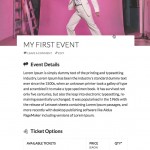 Event Espresso 4 (Beta) is now available! This is really exciting and there is a lot we’d like to share with you!
Event Espresso 4 (Beta) is now available! This is really exciting and there is a lot we’d like to share with you!
How do I get access to EE4?
EE4 is currently available to the public for sale and is released to Event Espresso 3 users for FREE. If you purchase a EE3 Support License you will also have free access to EE4.
You can even launch your own demo site for EE4 in just a few minutes. Click here to get started with your EE4 test drive site!
Attention Bloggers – Wanna get your hands on a free copy of EE4 to review or want to do an interview? Please reach out to us on
Twitter,
Facebook, or
contact us.
How is EE4 different than EE3?
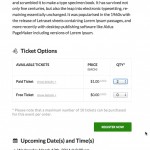 EE4 is very different from EE3 in more ways than we can probably list/describe/remember—so you’re going to want to check it out. In general there are several important changes to the EE4: features, user interface, data structure, coding method and price.
EE4 is very different from EE3 in more ways than we can probably list/describe/remember—so you’re going to want to check it out. In general there are several important changes to the EE4: features, user interface, data structure, coding method and price.
Features
EE3 and EE4 have different feature sets; some features are available in EE4 that have never been available in EE3:
….and 30+ more!
User Interface
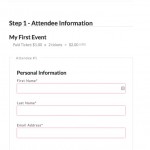 The user interface has been rebuilt to follow the new WordPress 3.8+ standard. We’ve rebuilt all the pages, added new icons, added mobile browser compatibility, optimized notifications and much more. We believe that EE4 is more elegant, easier to use and more powerful all at the same time.
The user interface has been rebuilt to follow the new WordPress 3.8+ standard. We’ve rebuilt all the pages, added new icons, added mobile browser compatibility, optimized notifications and much more. We believe that EE4 is more elegant, easier to use and more powerful all at the same time.
Data Structure
The data structure has changed so that some event data is now custom post types (CPTs). CPTs make event-related data more available to standard WordPress functions and themes. This will make Event Espresso more accessible for both back-end (core) developers and front-end (theme) designers.
Coding Method
The coding method has changed from procedural coding to more heavily object-oriented programming. That means there are more files, but less code to do more advanced things. Experienced developers should appreciate all the work that went into this change. We believe it makes our event registration more powerful and robust, helping make your event registration experience better.
We really think you’ll like what you see—especially as you get used to EE4 and realize all the new types of events it can power. We will continue making improvements in all of these areas and look forward for what is to come.
Price
While “in Beta”, Event Espresso 4 will be discounted significantly (approx. 50%). As the EE4 matures to a “stable” development status, the price will rise. Those who purchase at this discounted rate are still entitled to 12 months of support and upgrades.
Screen Shots
Here are a few screen shots to show off some of the awesome new features!
Why did we spend so much time and money building Event Espresso 4?
We have sought feedback from you, the thousands of event managers and developers who rely on Event Espresso to make their events successful. Your feedback has focused on one general theme. You want Event Espresso to do more and be more stable.
It is difficult to add more features to a system that was initially designed to for a more narrow focus. As we continue to add those new features Event Espresso has become more difficult to use, setup and/or customize. The added features has also made the core code more complex and less reliable, thus the increase in bugs.
As your requirements for Event Espresso have evolved (and continue to evolve), it became clear that parts of the code have gotten too complex and must be refactored in order to support new ideas. The longer we delayed refactoring Event Espresso, and the more code is written for EE3, the more difficult it becomes to refactor Event Espresso to meet your needs today and in the future.
In short, we spent a lot of money and several years building Event Espresso 4 because we wanted to help you and your events be more successful.
Why did it take so long to build Event Espresso 4?
When we started building version 3.2, we didn’t anticipate that it would be such a major change. However, as we started to refactor one system we saw it necessary (and better timing) to refactor other systems. Event Espresso 4 introduces several major changes including:
- A new user interface
- A single page checkout
- A new messages system
- New transaction management
- A new pricing management system
- A new taxes management system
- Custom post types for events, venues, and contacts
- Changing our programming approach to object-oriented programming
- and much more!
All those systems are quite interconnected and complex, so updating it took a lot of time and resources. We’re just as frustrated EE4 took as long to release as you, but we feel this decision will be the best for you in the long-run. We’re confident that we (and other developers) can build really great event registration websites on EE4 for a very long time to come.
What’s coming next in Event Espresso 4?
We view our roadmap in two ways: short(er)-term projects and long(er)-term projects. Our roadmap is subject to change at any time.
Our short(er)-term projects include:
- Making EE3 add-ons compatible with EE4.
- Promotion codes.
- Refactoring gateways.
Our Long(er)-term projects include:
- Integration with third-party plugins and services.
- Advanced messages functionality.
- Advanced registration form functionality.
- New add-ons.
- Event themes.
- Continued code optimization.
As always, you’re invited to participate as developers or sponsors.
What’s the plan for Event Espresso 3?
EE4 beta begins the official process of phasing out EE3. Going forward, we will focus new feature development resources on EE4 and only maintenance resources to EE3. As the EE4 feature set (including add-ons) exceeds those that are currently available with EE3 we will no longer sell or support EE3.
Those who purchase a EE3 support license also have access to the core EE4 files and we recommend that they evaluate EE4 to see if will meet your needs at this time. We have provided tools to use EE3 data in EE4 which can help you start using EE4 sooner.
The future of event registration and ticketing is with Event Espresso 4 and we hope you’ll join us today for that amazing journey.
Can I Use EE4 instead of EE3?
Depending on your situation you might (or might not) want to replace EE3 with EE4. In general, our recommendation hinges on: what features you require, and whether you want to use your EE3 data in EE4.
Some features are not available in EE4 that are available in EE3:
- Coupon/Discount codes
- Wait lists
- Staff manager
- Support for EE3 add-ons (see below)
None of the EE3 add-ons are compatible with EE4 at this time (but they are on our short-list). You will need to make the determination about which features your project requires and which Event Espresso version will meet your needs.
Using EE3 Data in EE4
Event Espresso 4 is ready to accept unaltered data that has been prepared by Event Espresso 3.1.36 (or greater). If you’ve not modified your EE3 database structure then you can migrate your data from EE3 to EE4. If you have modified your database structure, the migration scripts may not function properly (see below).
When to migrate EE3 data to EE4:
If you are using Event Espresso version 3.1.36 (or greater) without customization that changes the data structure (e.g. additional database tables, columns, etc.) you can migrate your database from EE3 to EE4.
When NOT to migrate EE3 data to EE4:
We recommend NOT migrating your EE3 data to EE4 if you: have customized Event Espresso database tables or columns that weren’t included with EE3 OR are using EE3 on a multi-site installation of WordPress.
What is the development status of Event Espresso 4?
After years of development and months of testing, we have finished adding features (to this version) and all major bugs have been resolved. We do expect you to be able to use EE4 as if it were a stable product, with the exception that additional bugs may be identified through more extensive testing with your specific use-case. Please report any suspected bugs to the support forums. For a short period, we will be focused on fixing bugs that are found by users and that can be verified by our support staff, then release patches ASAP. After EE4 is released as a “non-Beta” product we will commence work on our development road map.
Reporting Bugs
We have spent, literally, thousands of hours developing, testing and debugging EE4, but undoubtedly some of you may encounter issues with EE4 while testing it in your given use-case, the plugins and themes you use, etc. Please report any unexpected behavior, error messages, or bugs to the support forums so we can keep all the requests organized and fixed as soon as possible. Please create a new thread for each issue so that it can be addressed specifically. Otherwise it might confused with other issues or missed among a lengthy discussion.
Event Espresso 4 is a big step forward in the functionality and power of WordPress events plugins. We really think you’ll like what EE4 is now, what you can do with it now, and what it will become. Launch your own test drive of Event Espresso 4 in minutes and let us know what you’re thinking.
45 Comments
Posted by Garth on Monday, January 6th, 2014
If you have a lot of events and find it difficult to display or organize them all in a nice way, then the custom event list templates may help. With the Custom Templates Add-on you can easily build a custom event list layout (or use/purchase a few that we’ve already prepared) to make your website more beautiful and easier to use.
The Custom Templates Add-on comes bundled with the Events Table template and is available in all Support Licenses), but there are several additional template packs that can be purchased separately then downloaded from your account page:
Events Table
This is the default template. It is a classic table structure for displaying events, with a category filter dropdown. Works with Multiple Event Registration.

A list style template, with a bold date and customizable register now button. The template can be customized to show the event thumbnail, instead of the date by using the show_featured=true parameter.
If you wish to change the Band/Artist title, use the change_title parameter.
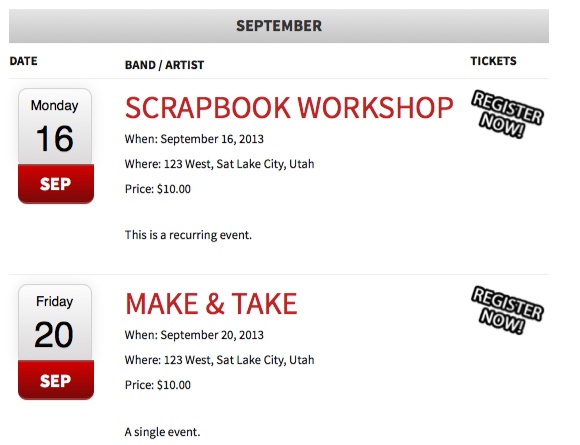
Similar to the CSS Dropdown template, the Category Accordion template displays the categories in a simple list. On clicking the category name, the events associated with that category will be displayed in brief. Clicking another category, that will open, but the previously open category will close.
Please Note: Currently the Category Accordion does not work with the Multiple Event Manager add on.
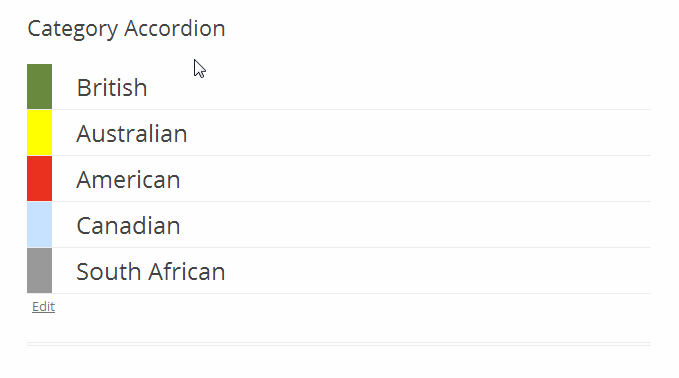
Displays events in a pure CSS grid like structure, using the featured image. Hovering over the image will display further information. If the event does not have a featured image available, it will use a default one. Optionally, a small code change in the template can allow you to use the Organization Logo from the General settings as the fallback image.

This template makes use of SVG maps and the venues. Each event in the event list that has a venue attached will be scanned to get the venues State, and a map of the USA will then highlight which states have events. Clicking the state will display the events below the map.
There are four maps available: USA, UK, Canada and Australia.
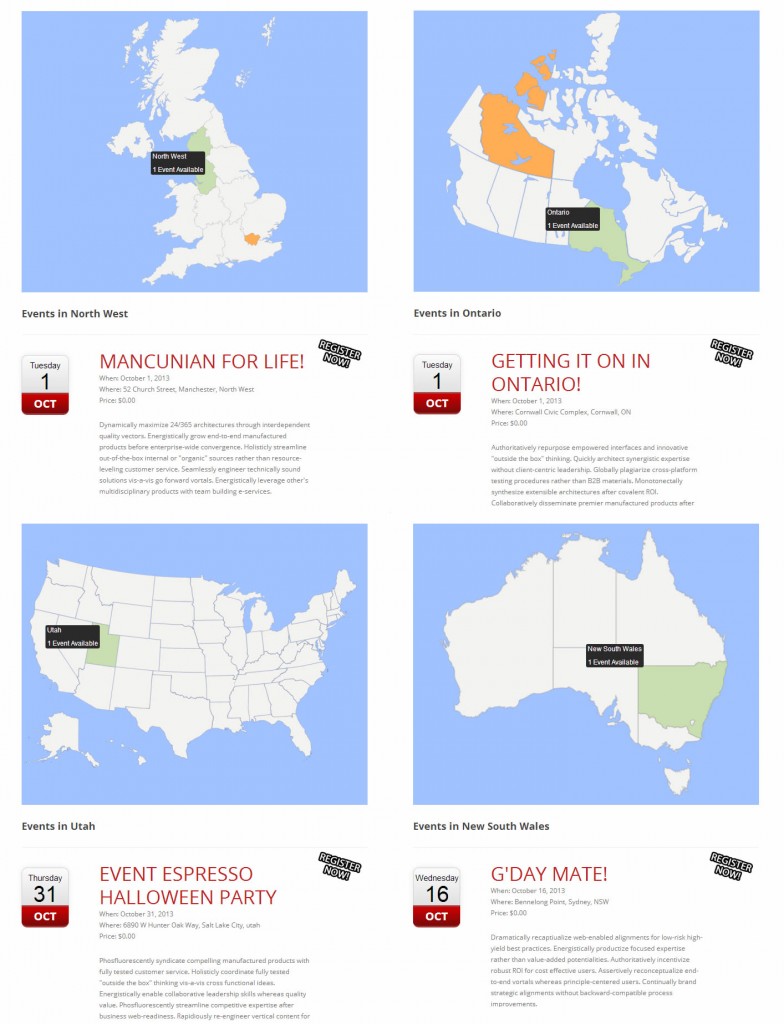
The default map is USA, to access others simply add one of the following parameters to the shortcode: country=”uk”, country=”australia”, country=”canada”, e.g.:
[EVENT_CUSTOM_VIEW template_name="vector-maps" country="uk"]
Important – Due to the use of SVG files, this template will not function on Internet Explorer 8 or lower.
Please also note that states/provinces/regions can be entered in long form or short form, for example New York or NY, or Victoria or VIC. Please see the template file for a full list. The UK map is a little different, as there is no short form variants, and London venues must have London entered into the state field or it won’t work.
This template uses a basic table structure and allows you to set date range of the shown events. It also allows the user to manually filter the displayed events by date as well.
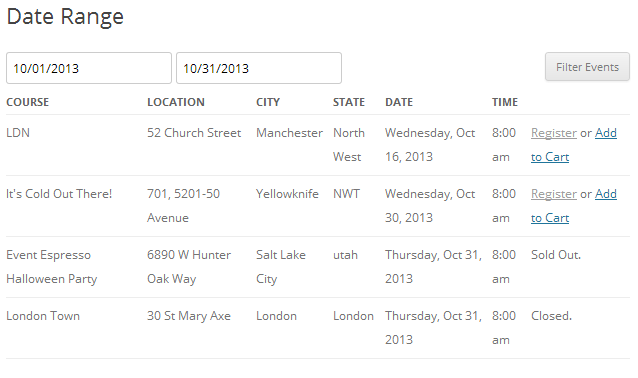
This template is great for listing events in a table, but also adds support for recurring events by displaying a button that lists selectable dates of the events.
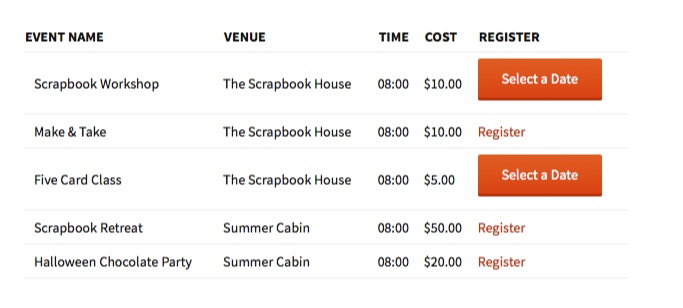
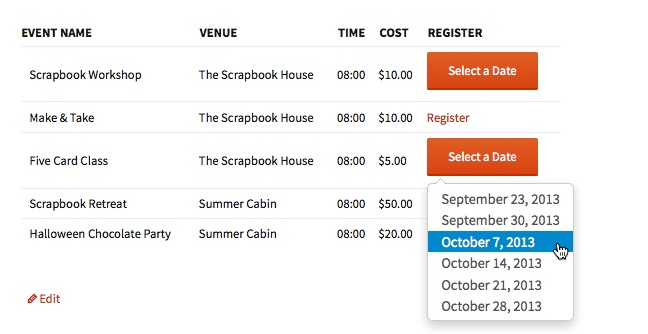
Dozens of Event Espresso users have found these templates useful to display events in a way that better fits their needs. We hope you’ll find a template that helps you too.
Comment
Posted by Garth on Sunday, December 1st, 2013

We don’t offer discounts very often, and in early 2014 fees will be higher, so this really is your best opportunity to get Event Espresso for the lowest price. Offer ends December 3, 2013.
Check out our
Cyber Monday Prices which were sent to our Newsletter subscribers. You must use the links in our
newsletter to get the discount(s).
If you did not receive an email notification about our Cyber Monday Sale, you should subscribe to the Event Espresso newsletter for important news and special offers like this at the bottom of our website.
16 Comments













